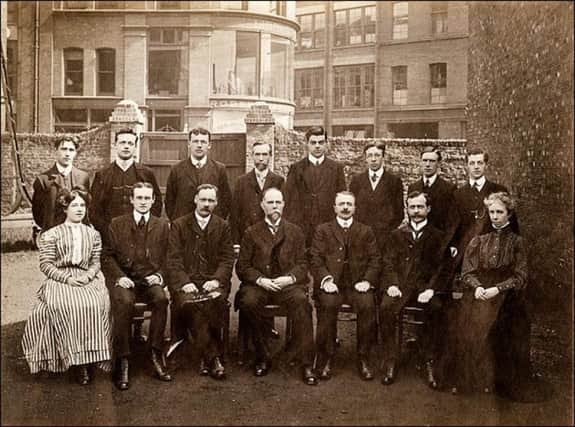Eleven men swapped the silence of the library for the horrors of war


The following extracts from WWI letters share a unique link: “I have twice been right in amongst the wire in front of the German trenches without being seen but it is not the kind of thing I would care to make a pastime of…”
“Any amount of sniping and shell fire, and the beastly weather, has made our trenches villainously muddy. Some places we have been in we have had the mud thigh deep. It is not ordinary decent mud, but an evil smelling slime which penetrates everything…”
Advertisement
Hide AdAdvertisement
Hide Ad“This is Christmas Eve and I am spending it in an ex-German dug-out about 60 feet underground. It is composed of passages and we have to sit all day with knees touching our chins, and at night when we lie down we are as close together as sardines in a tin…”
“I’ve had the ill-luck to be badly wounded in the left hip…”
“I hope you will excuse this scribble as we are near the firing line…”
“I received word on Monday that young William Brown had been killed. He is the first of our lot to fall…”
Advertisement
Hide AdAdvertisement
Hide AdThose short extracts are from a unique collection of handwritten letters sent by 11 former Belfast library-staff from the battlefields of WWI.
Tragically, the final extract was a death notice.
The letters are on display throughout September in Chichester Library, Salisbury Avenue, Belfast, as part of this year’s Community Relations and Cultural Awareness Week.
Running until 24 September under the theme of ‘Safe Space, Shared Place,’ the week’s programme includes over 160 events all over Northern Ireland celebrating cultural diversity and focusing on our shared future whilst remembering the past.
Chichester Library’s touring exhibition called ‘Library Men of WW1’ offers vivid insights of a war that helped to shape our shared history.
Advertisement
Hide AdAdvertisement
Hide AdAmongst the many local people who fought and died in the Great War were the 11 members of staff from Belfast’s public libraries.
They sent over 200 letters home to library colleagues and management (see main photograph) between 1914 and 1919.
The letters were ‘a condition of employment’ - the writers getting a reduced salary from the Library HQ whilst on frontline duties.
Often agonisingly descriptive, their accounts were of all the aspects of war - the training camps, the trenches and demobilisation.
Advertisement
Hide AdAdvertisement
Hide AdThe ‘front-line correspondents’ with variously-local addresses were from different branches, backgrounds and religious denominations.
Most were Belfast-born, some were from outlying regions of Northern Ireland, and others came here from England.
Some writers were more prolific than others and their writing styles varied - factual, poetic, eloquent, uncompromising.
Joseph (Joe) Fitzsimons’s, a 25-year-old, Ballycastle-born Nursing Orderly, penned a letter from a Casualty Clearing Station in France in 1919.
Advertisement
Hide AdAdvertisement
Hide AdSent to Chief Librarian John B. Goldsbrough, it reads like a lazy, hazy, holiday-postcard, contrasting harshly with horror.
“The weather here at present is fine and the country around looks glorious. All the terrible scars of war have been camouflaged by nature. The shell holes and trenches are ablaze with poppies and other coloured flowers. The ruined buildings and barbed wire are the only reminders of four years of carnage.”
Fitzsimons, Assistant Librarian in Belfast Public Libraries’ Lending Department, went to France at the end of November 1915 as a ‘1st Class Nursing Orderly’.
His dramatic prose from his Casualty Clearing Station highlighted daily routine and the bravery and tragedy that he witnessed.
Advertisement
Hide AdAdvertisement
Hide AdAn earlier letter from Fitzsimons in 1917 vividly recounted a terrifying manoeuvre.
“Our casualties though fairly heavy have not been so heavy as was expected. Unfortunately, the severe wet weather has delayed operations. Our attack was opened up by a terrific bombardment of German positions and then artillery.
“For days previously old Fritz has been giving our boys [socks] with his big guns. No retaliation was made as this would only cause him to change the position of his artillery. “However the morning of the attack our gunners had their own back with interest. Our artillery barrage is described as the greatest in history of modern warfare and it well deserves that explanation, it simply made the earth quake and the hundreds of German wounded testified to its efficiency.
Several thousand prisoners were taken but this number would have been trebled had our artillery spared them.”
After the war, some of the Belfast library-men prospered.
Advertisement
Hide AdAdvertisement
Hide AdMajor Thomas Coulson, formerly Branch Library Manager on Falls Road, wrote a note from the trenches in France in December 1915.
“We are almost literally stuck in the mud here. Rain, rain, rain, day after day is a horrible prospect for men who have to live underground for a month at a time.”
After the war Coulson wrote several successful books including ‘Mata Hari: Courtesan and Spy’, which was published in 1930 and subsequently made into a major motion picture.
Other former library staff returned to Belfast with little chance of a normal lifestyle, their extensive injuries making it difficult for them to settle back into employment and civilian life.
Advertisement
Hide AdAdvertisement
Hide AdWilliam Brown, Assistant Librarian at Belfast Central Library, never returned, killed in France aged just 23 in August 1918.
Many of William’s letters from the front had ended “Please remember me to all staff.”
Full information about ‘Library Men of WW1’ is on www.librariesni.org.uk/librarymenofww1.
The Community Relations and Cultural Awareness Week is at community-relations.org.uk